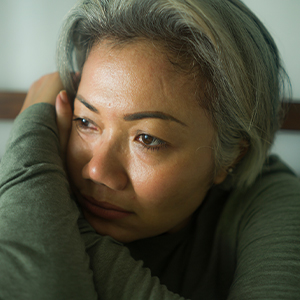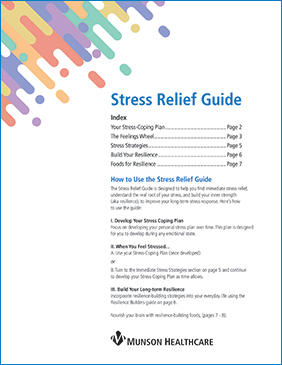Is it Depression or Something Else?

Feeling sad from time to time is a part of life. But for people with depression, these feelings interfere with daily living on a continual basis.
Depression is a real illness that can develop at any age. It is one of the most common mental health problems in America. Depression makes you feel sad, helpless, and hopeless. It gets in the way of your life and relationships. Your work, friendships, and self-care may suffer. Depression causes chemical changes in the brain that inhibit your ability to think and act.
“The stressors and isolation from the pandemic have impacted our mental health,” says Terri LaCroix-Kelty, MSW, Director of Munson Behavioral Health Services. “The good news is that there is always hope and help available. Psychotherapy, medication, and self-care are highly effective for the treatment of depression. Let’s encourage each other to seek the care that we need when we need it!”
Know the symptoms of depression

Sadness is one symptom of depression, but there are many others. Sometimes it can be hard to tell whether you are depressed or just feeling blue.
Here are some symptoms to watch for in yourself or your loved ones:
- Feeling sad or anxious
- Feeling guilty, helpless, or worthless
- Loss of interest in hobbies and activities
- Feeling hopeless
- Having less energy or feeling tired (even after sleeping well)
- Too little or too much sleeping
- Having trouble concentrating or making typical daily decisions
- Changes in appetite or weight
- Headaches, stomachaches, or other aches and pains
- Feeling irritable, nervous, restless, or jumpy
- Thoughts of suicide or death
If you (or a loved one) have most or all of these symptoms every day for at least 2 weeks, you may have depression.
Depression and other illness
It is common for people who have chronic health problems to also have depression. It can often be hard to tell which one caused the other. A person might become depressed after finding out they have a health problem. But some studies suggest being depressed may make certain health problems more likely. And some depressed people stop taking care of themselves. This may make them more likely to get sick.
When to Get Help

The good news is you can start to feel better again with the right help.
If you have symptoms of depression, talk with your healthcare provider. He or she may refer you to a counselor or other mental health specialist. Your healthcare provider may also prescribe medicine for your depression. A combination of counseling and medicine can be helpful in treating depression.
In fact, up to 80% of people who are treated for depression with medication, psychotherapy, support groups (or a combination of these treatments) show an improvement in their symptoms generally within four to six weeks. Even people with severe depression can recover.
Studies have shown that exercise can also be helpful in treating depression. And getting regular exercise, like walking, is also a great way to keep your heart healthy.
Call for Help
If you have thoughts of harming yourself, get help right away. If you're at immediate risk, call 911 or go to the nearest hospital emergency room.
You can also get help right away by calling the National Suicide Lifeline at 800-273-TALK (800-273-8255). This free, confidential line is open 24/7, 7 days a week.
How to Help Someone Who’s Struggling

If you're worried about a friend or loved one, ask them in a caring way if they are thinking of harming themselves and help them get support. Here are some resources:
- National Suicide Prevention Lifeline. This hotline is available 24 hours a day, 7 days a week at 800-273-TALK (800-273-8255). Or contact them online at 988lifeline.org/. This resource provides immediate crisis intervention and information on local resources. It's free and confidential.
- National Institute of Mental Health. Visit their website at www.nimh.nih.gov to learn more about depression
Feeling Stressed? Need Help Navigating Your Feelings?

Get Started with our Stress Relief Guide
This resilience toolkit can guide you through your stress from start to finish. Included in the toolkit
- Vocabulary to help identify your real feelings
- A worksheet to help build your personal stress-reduction plan
- Ideas for healthy coping strategies that you can practice anywhere
- Long-term resilience builders, including food!